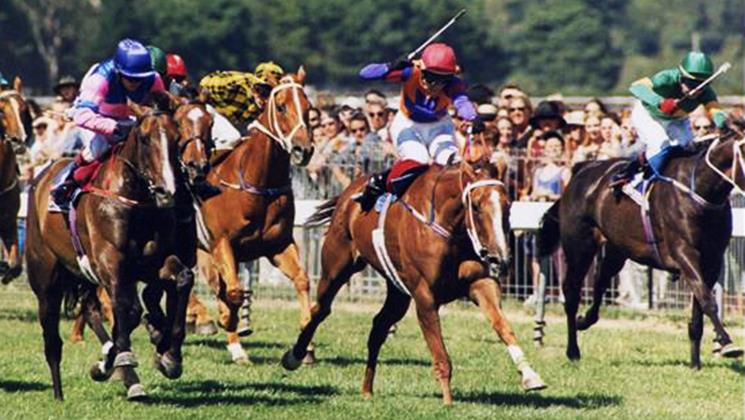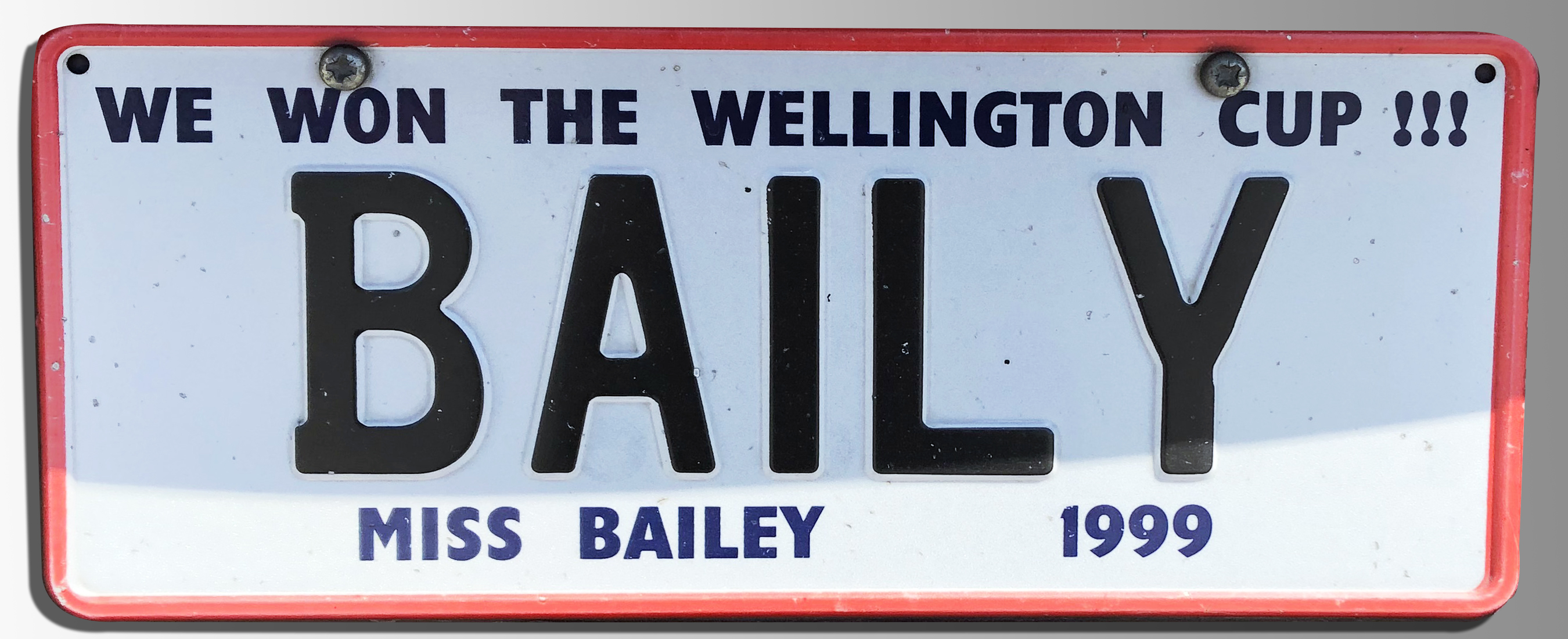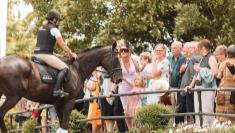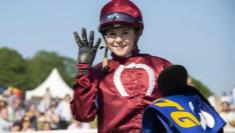
Flashback - Wellington Cup - Miss Bailey
Miss Bailey (Outside) on her way to winning the 1999 Wellington Cup
“Just make sure you leave some room for the Cup,” Wayne Mudgway optimistically told his travelling companions, as they tossed their bags into the boot of his SUV at the start of their annual trip to the Wellington Cup.
It was January 1999 and John Jenkins, Hugh Ross and Pete Deslandes were joining Mudgway on what had become- and still is – a summer ritual for the Hawke’s Bay mates.
Jenkins, a racing journalist, watched Good Lord win the 1977 Wellington Cup and hasn’t missed one since. Mudgway has missed just one since 1982 and Deslandes and Ross have also been regulars.
Work commitments will prevent Ross being at Trentham this Saturday but Mudgway, Jenkins and Deslandes are booked in again.
They will enjoy the weekend, but it won’t compare to 1999, the year “Mudgy” won the Cup with the outsider of the field.
Mudgway owned Miss Bailey who recorded one of the most unexpected wins in a race that has been held since 1874.
Miss Bailey will never be mentioned among the great Wellington Cup winners, and it’s 20 years since her Trentham triumph, but her name still strikes a chord with the general public, particularly those who backed her.
Backing a horse who pays $143.70 in one of New Zealand’s most famous races tends to stick in the memory.
Mudgway now drives a car with a number plate that commemorates the win. “We have had quite a few messages left under the windscreen wipers saying ‘we backed her’ and just last year we came out of a café and a group were having a photo taken alongside the number plate.”

Miss Bailey, who had run sixth in weaker company the previous weekend, was making her open class debut in the Wellington Cup, as a seven-year-old, and just scraped into the field.
She had already been retired once and was in her first season with a tyro trainer. The jockey who had ridden her in her previous win - and on the first day at Trentham - switched to another horse for the Cup.
In addition, there was plenty of depth in the 1999 Cup, which still had Group I status. Miss Bailey’s rivals included five of the first six placegetters from that month’s Auckland Cup, a previous Wellington Cup winner in Ed, and the previous season’s NZ St Leger winner.
Which is why Mudgway’s mates chuckled when he suggested leaving room for the Cup. “Mudgy had kept putting bits and pieces on her every time her fixed-odds price went over $100 but he was the only one of us who got any money off her,” Jenkins said. “I got the double [with Miss Bailey] but only because I took the field with [Thorndon Mile winner] Surface.”
The Cup win came a year after Miss Bailey had finished 20 lengths from the winner in a lower-grade race at Wairoa, prompting her trainer Bruce Marsh, who was based at Woodville, to suggest that it was not worth persevering with her as a racing proposition.
The mare had already suffered a tendon injury, which kept her away from the races for 18 months, and her soundness issues meant she recorded just one placing from six starts as a six-year-old. Mudgway agreed that retirement was the logical option.
later that year, a woman approached Mudgway about buying Miss Bailey and offered $400. “Give me $600 and you can take her,” Mudgway said. He never heard back.
A short time after, Hastings trainer Grant Cullen inquired about trying Miss Bailey as a racing proposition again, suggesting that using the equine pool at Hastings might help the mare. As no one else had offered to buy Miss Bailey, and her broodmare potential was limited, Mudgway agreed to let Cullen "give her a go."
“She did most of her work for Grant in the pool,” Mudgway said.
Mudgway had raced Miss Bailey on his own till then but for her final campaign he leased the mare to partner Annemarie Bailey and cousin Kris Eckhold.
Cullen, who was 32 when Miss Bailey won the Cup, has been involved with racing all his life and now trains successfully in partnership with Guy Lowry.
But when Miss Bailey joined his team, Cullen was in the early stages of a solo training career and still working part-time as a sign writer. He had had only 53 runners and four wins over his four previous seasons and the Wellington Cup win was just the seventh of his career.
But he had the foresight to nominate Miss Bailey for the Wellington Cup when she was still a two-win horse, buoyed by a positive report from jockey Hayden Tinsley after the mare ran second in a 2000m class two race at Woodville in November, two days before entries closed.
There was further encouragement when Miss Bailey made most of the pace to win the class three Taupo Cup (2000m) in early January. “Every time another payment [for the Wellington Cup] was due, she would go a good race,” Cullen said after the win.
The Wellington Cup was still a significant step up from the Taupo Cup and Miss Bailey gained the last spot in the Trentham field. But she was hard fit and Cullen, who had been confident that the mare could cope with 3200m, instructed rider Leanne Isherwood to go to the front and quicken the tempo from the 800m.
“She deserved to be at long odds but we did go into the race with a plan and we did think she would stay,” Mudgway said. “She had a starter’s chance and it all went our way.
“I told people who asked me that she was worth a small bet at the odds. If you had put five each-way on, the return was $1000.”
Miss Bailey set the pace and though headed by runner-up Emerald in the straight, fought back to win by a short head. The seven-year-old crock, who went into the race with career earnings of $15,970, had claimed the first prize of $155,000.
Mudgway watched the race from the owners’ room in the birdcage area. “The crowd was too big to try to get a place in the stand. I ran into the birdcage as they crossed the line and I was the only one there. It was incredible. I was probably in shock, but it was an amazing feeling.”
Jenkins sprinted to the birdcage from the press room. “Mudgy was doing handstands and jumping up and down and shouting ‘we’ve done it, we’ve done it.’ We ended up hugging each other near the No. 1 stall.”
It was the forerunner to a big night at the car park party at Trentham. “It was one of the first years that they had shields made with the colours of each Cup runner and Miss Bailey’s colours were propped up on the windscreen of Mudgy’s Prado,” Jenkins remembers. “It was like a magnet and everyone was coming over.
“It was an amazing day. That weekend probably took two years off my life but it was one we will never forget.”
For Mudgway, one of the lasting memories came on Sunday morning. “It was a crazy night and we didn’t get to bed till about 4am. But I couldn’t sleep and woke up about 5.30 and went down to Courtenay Place and bought a Sunday paper. I remember looking at the results and thinking ‘ít really did happen’. I got quite emotional at that point and shed a tear.”
Miss Bailey had another campaign the following spring but had decided that she had done her bit and ran last in four of her five starts.
Mudgway bred seven foals from Miss Bailey but the Kings Island mare, who was put down in 2010, left just one winner from six foals to race, though a Don Eduardo filly made $180,000 at Karaka in 2006.
Remarkably, Mudgway had another Wellington Cup runner the following year. Paddy Maloney had much better credentials than Miss Bailey, after finishing second in the New Zealand Cup and fifth in the Auckland Cup, and started fourth favourite at Trentham but ran sixth.
Mudgway has won more than 80 races as an owner, many with horses he helped syndicate. He has also been a racing administrator and sponsored the opening leg of the Hawke’s Bay Triple Crown for many years.
However, he is no longer involved as an owner or breeder. “I still love the industry, but golf is my passion now and it’s probably a case of been there, done that [with racing”].









